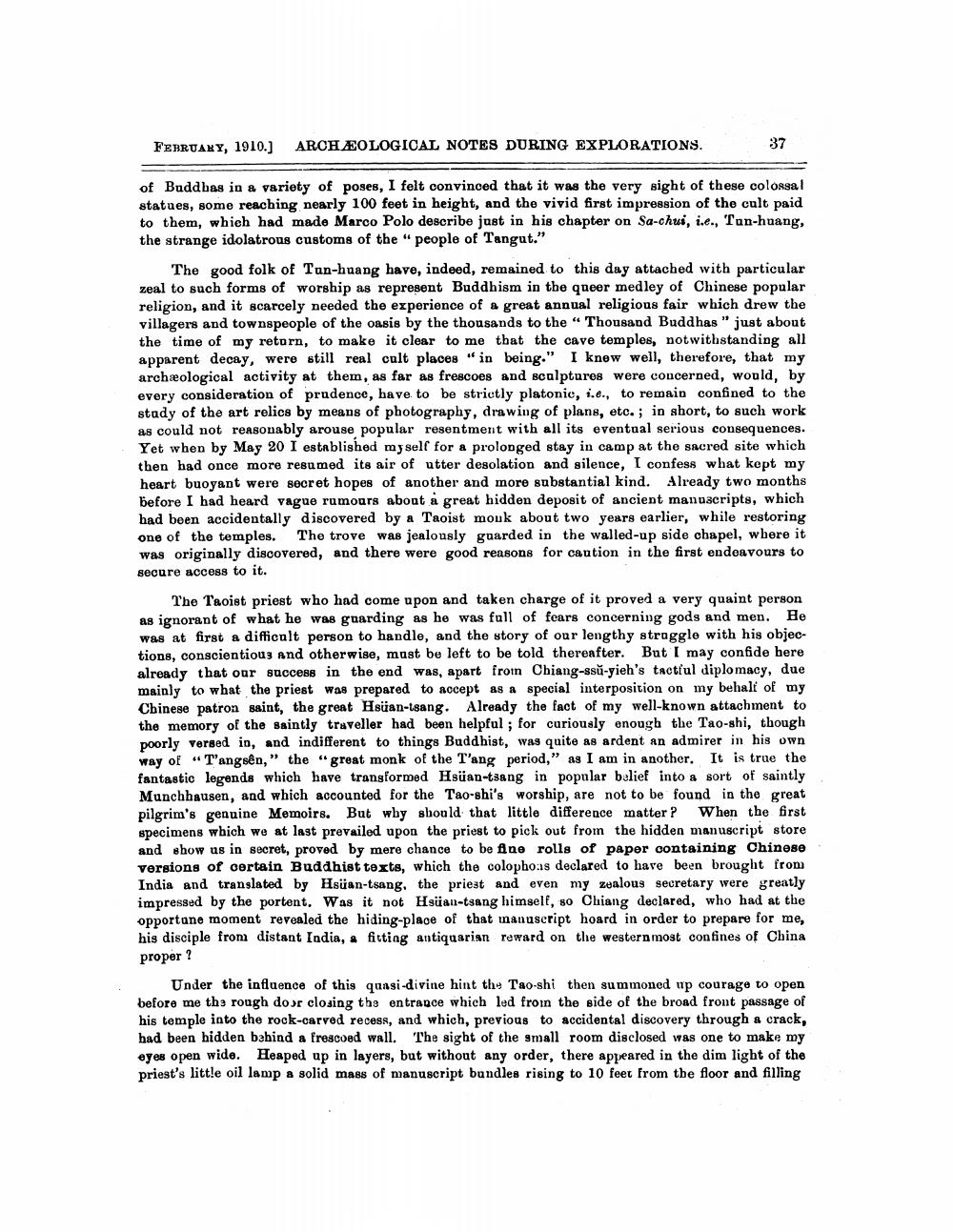________________
FEBRUARY, 1910.] ARCHÆOLOGICAL NOTES DURING EXPLORATIONS.
37
of Buddhas in a variety of poses, I felt convinced that it was the very sight of these colossal statues, some reaching nearly 100 feet in height, and the vivid first impression of the cult paid to them, which had made Marco Polo describe just in his chapter on Sa-chui, i.e., Tan-huang, the strange idolatrous customs of the people of Tangut."
The good folk of Tan-huang have, indeed, remained to this day attached with particular zeal to such forms of worship as represent Buddhism in the queer medley of Chinese popular religion, and it scarcely needed the experience of a great annual religious fair which drew the villagers and townspeople of the oasis by the thousands to the “ Thousand Buddhas " just about the time of my return, to make it clear to me that the cave temples, notwithstanding all apparent decay, were still real cult places "in being." I knew well, therefore, that my archeological activity at them, as far as frescoes and sculptures were concerned, would, by every consideration of prudence, have to be strictly platonic, i.e., to remain confined to the stady of the art relics by means of photography, drawing of plans, etc. ; in short, to such work as could not reasonably arouse popular resentment with all its eventual serious consequences. Yet when by May 20 I established myself for a prolonged stay in camp at the sacred site which then had once more resumed its air of utter desolation and silence, I confess what kept my heart buoyant were secret hopes of another and more substantial kind. Already two months before I had heard vague rumours about a great hidden deposit of ancient manuscripts, which had been accidentally discovered by a Taoist mouk about two years earlier, while restoring one of the temples. The trove was jealously guarded in the walled-up side chapel, where it was originally discovered, and there were good reasons for caution in the first endeavours to secure access to it.
The Taoist priest who had come upon and taken charge of it proved a very quaint person as ignorant of what he was guarding as he was full of fears concerning gods and men. He was at first a difficult person to handle, and the story of our lengthy struggle with his objections, conscientious and otherwise, must be left to be told thereafter. But I may confide here already that our success in the end was, apart froin Chiang-ssă-yieh's tactful diplomacy, due mainly to what the priest was prepared to accept as a special interposition on my behalf of my Chinese patron saint, the great Hsüan-tsang. Already the fact of my well-known attachment to the memory of the saintly traveller had been helpful ; for curiously enough the Tao-shi, though poorly versed in, and indifferent to things Buddhist, was quite as ardent an admirer in his own way of “T'angsên,” the "great monk of the T'ang period," as I am in another. It is true the fantastic legends which have transformed Hsüan-tsang in popular belief into a sort of saintly Munchhausen, and which accounted for the Tao-shi's worship, are not to be found in the great pilgrim's genuine Memoirs. But wby should that little difference matter? When the first specimens which we at last prevailed upon the priest to pick out from the hidden manuscript store and show us in secret, proved by mere chance to be fine rolls of paper containing Chinese versions of certain Buddhist texts, which the colophoas declared to have been brought from India and translated by Hsuan-tsang, the priest and even my zealous secretary were greatly impressed by the portent. Was it not Hsüan-tsang himself, so Chiang declared, who had at the opportane moment revealed the hiding-place of that manuscript hoard in order to prepare for me, his disciple from distant India, . fitting antiquarian reward on the westernmost confines of China proper ?
Under the influence of this quasi-divine hint the Tao-shi then summoned up courage to open before me the rough door closing the entrance which led froin the side of the broad front passage of his temple into the rock-carved recess, and which, previous to accidental discovery through a crack, had been hidden behind a frescoed wall. The sight of the small room disclosed was one to make my eyes open wide. Heaped up in layers, but without any order, there appeared in the dim light of the priest's little oil lamp a solid mass of manuscript bundles rising to 10 feet from the floor and filling




